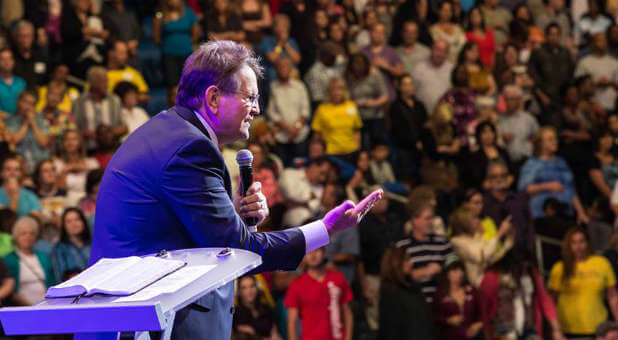I met Reinhard Bonnke several times during my days as editor of Charisma magazine. But my favorite memory of the German evangelist occurred in a small meeting with pastors on the east coast of Florida, near Stuart, sometime around 2005. Bonnke had gathered the pastors to float the idea of hosting a large evangelistic event in the region.
I sat on the front row and listened to this passionate preacher, who was famous for his booming voice and thick accent. He talked about what he loved most—reaching the lost—and then he announced that he wanted to pray for everyone in the room to receive a burden for evangelism.
People began scrambling in every direction. Chairs were carried to the back of the room so all the leaders could get near the stage. Everybody wanted the gifted evangelist to touch them. They wanted his anointing so badly they were willing to shove other people out of the way to get it.
But I could tell this attitude bothered Bonnke. He told the audience sternly that he couldn’t give them his anointing. And he also warned them not to fall backward if he prayed for them. “If you fall, fall at your own risk,” he said.
That was not a common attitude among other celebrity charismatic ministers I knew. Many of the more flamboyant preachers in our movement were known to hand out “special anointings” right and left—and a few of them suggested that you might get a stronger anointing if you gave $1,000 in the offering.
Those same guys would also encourage people to fall on the floor. And if you didn’t fall, they might push you down.
But Reinhard Bonnke didn’t play charismatic games. He didn’t whack people on the head to make himself look powerful. He didn’t need titles or swagger or religious theater to boost his ego. He never mishandled money. He was a simple man who had one priority—preaching the gospel to the unsaved. Bonnke always kept the main thing the main thing.
“Proclaiming the cross is not a side thought, an afterthought,” he said in an interview with Preaching.com. “It’s not on the back burner; it must be the front burner. … When I see how souls are coming to the arms of Jesus by the hundreds of thousands in my own crusades, I’m awed. And I know that there’s great joy in heaven.”
Bonnke died last week in Orlando, Florida, at the age of 79. The ministry he founded, Christ for All Nations (CFAN), says more than 79 million people made decisions for Jesus in his massive evangelistic campaigns, most of which were held in Africa.
Known affectionately as “the Billy Graham of Africa,” he was driven by a dream he had as a young man. After moving to Lesotho at age 24 with his wife, Anni, he saw a vision of the entire continent of Africa washed in the blood of Jesus.
His passion to preach to the masses is what motivated him to construct the largest tent ever made—one that held 34,000 people. But after a windstorm destroyed it, he realized tents were too small to hold the crowds he was destined to reach. It was not unusual for 100,000 Africans to come to his outdoor meetings. His largest evangelistic campaign, held in Lagos, Nigeria, in the year 2000, drew a crowd of 6 million.
Bonnke was a brave man. He was never content to stay inside the comfortable walls of the church and preach to the choir. He had to be on the front lines—even when it was dangerous for him.
His closest brush with death occurred in 1991 when he tried to sponsor a massive outdoor gospel rally in the city of Kano, Nigeria, where militant Muslims sometimes burn churches and murder pastors. Riots broke out. Bonnke had to cancel the meetings and flee the city because Christians were being killed.
“It appeared Satan had won,” Bonnke said of the Kano campaign. Yet nine years later, that record-breaking crowd came to his campaign in Lagos. A whopping 1 million people made decisions for Christ in that one event.
Bonnke never apologized for being a Pentecostal. He believed in the power of the Holy Spirit, and his many books—including Evangelism by Fire, Mighty Manifestations and Hell Empty, Heaven Full emphasize the need for the Spirit’s gifts in order to reach the lost. But Bonnke never cheapened the Spirit’s power with charismatic games.
Like a modern-day Elijah, Bonnke has now been taken to heaven. But his mantle has been passed on—to the many young leaders he mentored in his evangelistic training school, and through the many books he wrote. (I plan to dive into his autobiography, Living a Life of Fire, during the Christmas break.)
In this challenging season when style is often celebrated more than substance, and preachers play it safe, I want more of the humility, simplicity and courage that Reinhard Bonnke modeled for us all.











































